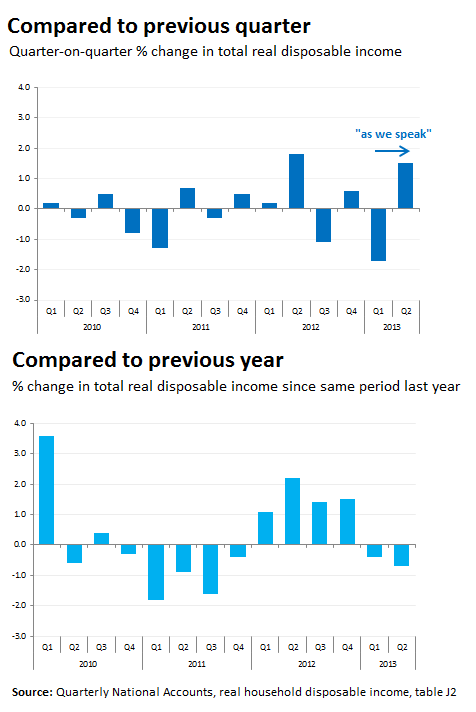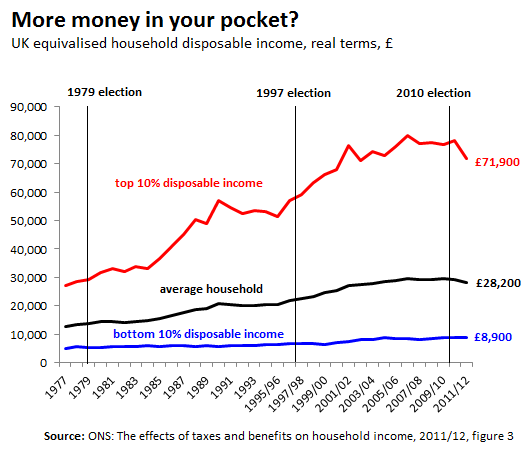Are disposable incomes rising as the Prime Minister claims?
"Disposable income went up last year and is rising as we speak."
David Cameron, Prime Minister's Questions, 16 October 2013
With 19 months still to go before the election, it may look to some as if the battle lines are already being drawn. Yet another exchange at Prime Minister's Questions today focused on the cost of living. Labour repeated its claim that real wages have fallen in all but one month since the Coalition came to power.
Meanwhile, the Prime Minister took a more positive view of proceedings, pointing out that disposable income was actually rising.
So can people's living standards be going down and up?
It's not a new question to ask: the BBC's Nick Robinson asked it back in July after the Chancellor, George Osborne, made a similar claim to the PM's. Then, as now, it's a problematic measure to choose.
Interpreting the PM
The PM's using the Office for National Statistics' measure called real household disposable income. This is basically the sum total of UK households' income after direct taxes (such as income tax and National Insurance) are taken away. In 2012, it rose by about 1.5% on the previous year. So yes, on this measure disposable incomes fell in 2012.
Is it rising? Debatable. Taking the PM literally, it is rising as we speak - or at least it did in the most recent data we have: it's higher in the second quarter of this year compared to the first quarter. But quarter-on-quarter changes are volatile. If we instead compare this year's performance so far with last year's, total disposable income is down by about 0.7%.

The problem is that this measure isn't very useful. In 2012, total disposable income on this measure across the economy was about £1 trillion. This number doesn't mean much to anyone, and whether or not it's risen or fallen since last year doesn't tell us anything about what's happened to an average household. There could just be more households than there were last year. So the average household could actually be losing income even if the total figure is going up.
So the Prime Minister is right if you take his claim literally - the total amount of disposable income in the economy did go up last year and has risen since the first quarter this year. But if we're talking about the cost of living for 'ordinary people', this data doesn't tell us a great deal on its own.
A better measure
If we're interested in how the average household's disposable income has changed, there's another measure produced by the ONS called 'average real equivalised household disposable income'. In plainer English this shows how, over time, the average household's income less direct taxes has changed (real = accounting for inflation, equivalised = accounting for the fact that households can contain different numbers of people).
It's more useful than the PM's measure since it tells us something about disposable income per head rather than a meaningless lump sum applying to the whole economy.
On this measure, however, the PM's claim doesn't stack up. Average disposable incomes are falling and have been since 2009/10.

The change isn't uniform. Incomes have fallen faster for those households in the top 10% when it comes to post-tax income. Disposable income has actually risen slightly for the poorest 10% on this scale from £8,800 in 2009/10 to £8,900 last year.
Obviously, this measure isn't as up-to-date and only gives figures for financial years. However, it's a much better way of telling what's happening to people's disposable income, and even how this changes across the income spectrum.